Menu
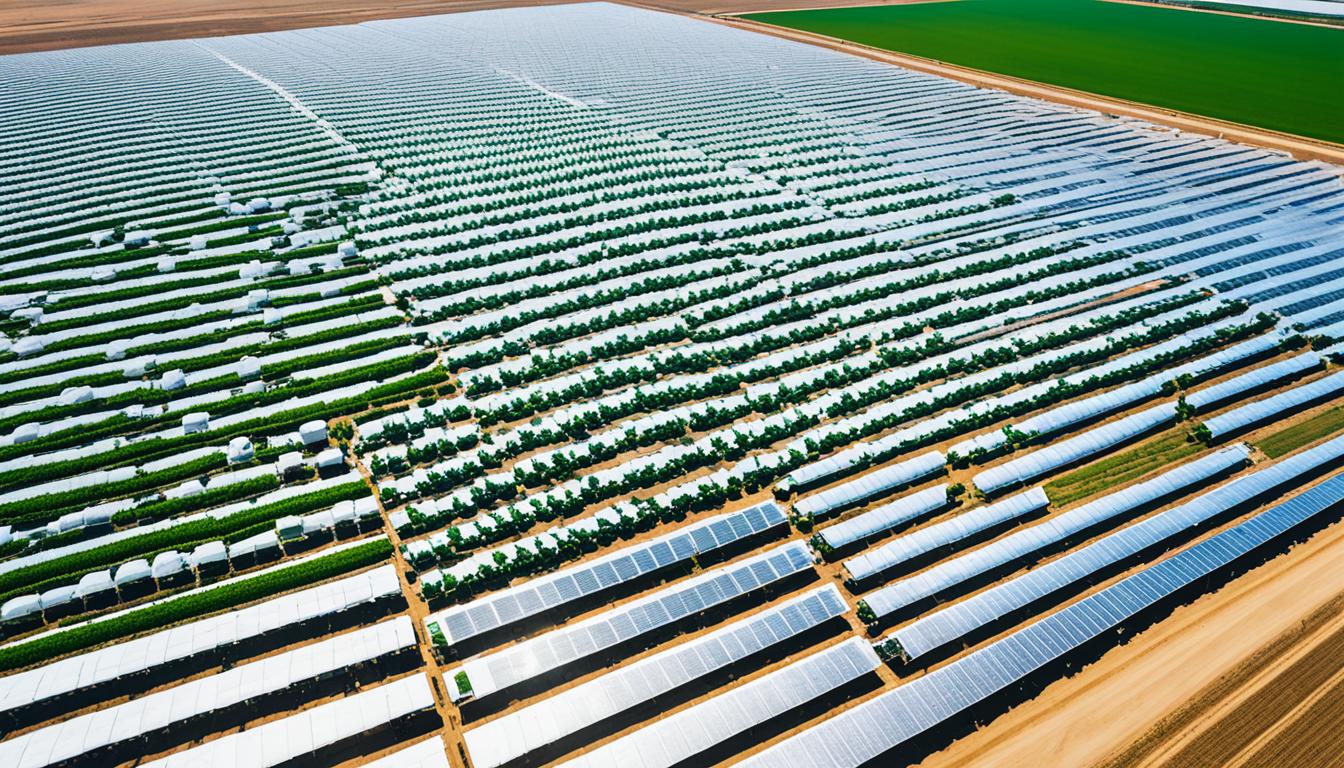
Israel, known as the ‘Startup Nation,’ has achieved amazing agricultural productivity records. This is impressive, considering the nation’s dry soil and limited water. Their success comes from using advanced tech, like irrigation systems and AI. This not only helps grow more crops but also promotes sustainable farming globally.
Israeli farms are leaders in innovative, sustainable farming despite tough conditions. They use smart technology to make the most of their land and resources. By doing this, they play a big role in feeding the world. Israel is a great example of how to farm smart, with lessons for everyone.
Precision agriculture in Israel is changing how we farm. It uses data and different skills to tackle issues like water scarcity and dry land. Israel is leading the way in this important shift in agriculture tech as we approach a growing population and need more food.
The idea of precision agriculture means using technology to make farming better. It started in northern Germany and Denmark in 1988 with technology that could adjust applications based on what a field needed. The use of GPS to map fields was a big step forward. Then, in 2011, the fourth industrial revolution brought smart farming to life with IoT, big data, AI, and robotics.
This method isn’t just for crop farming but also for animals, fish, and trees. It uses things like drones, robots, and remote sensors to gather and study data. This information helps farmers make choices that take better care of the planet and use resources wisely.
Israel has become a key player in agriculture innovation because it has learned how to deal with tough environmental issues. It’s very dry in parts of Israel, so the country has become very good at using technology to make the most of its land. Israel has excelled in areas like using recycled water for irrigation and adding things to soil to keep it moist. All of this helps overcome the challenges of limited water and resources.
Also, Israel is known for its startup culture, and it keeps on making advances in agriculture technology. The country uses AI, remote sensing, and robotics to show the whole world what the future of farming can be. Israel is not just about using one technology; it’s about combining different technologies to make farming better for the planet and people alike.
| Year | Development |
|---|---|
| 1988 | Variable rate applications demonstrated |
| 1990s | GPS technology for precise field mapping |
| 2000s | Development of yield monitors |
| 2011 | Introduction of Industry 4.0 in agriculture |
| 2017 | Transition to smart farming |
By combining top tech with smart water use, Israel’s farming gets a huge boost. This model doesn’t just help locally; it’s a big win for feeding the world safely and sustainably.
Israeli agriculture has a deep history, evolving in methods and tools over time. At first, people used traditional ways, suited to the area’s specific weather and land. This set the stage for later developments.
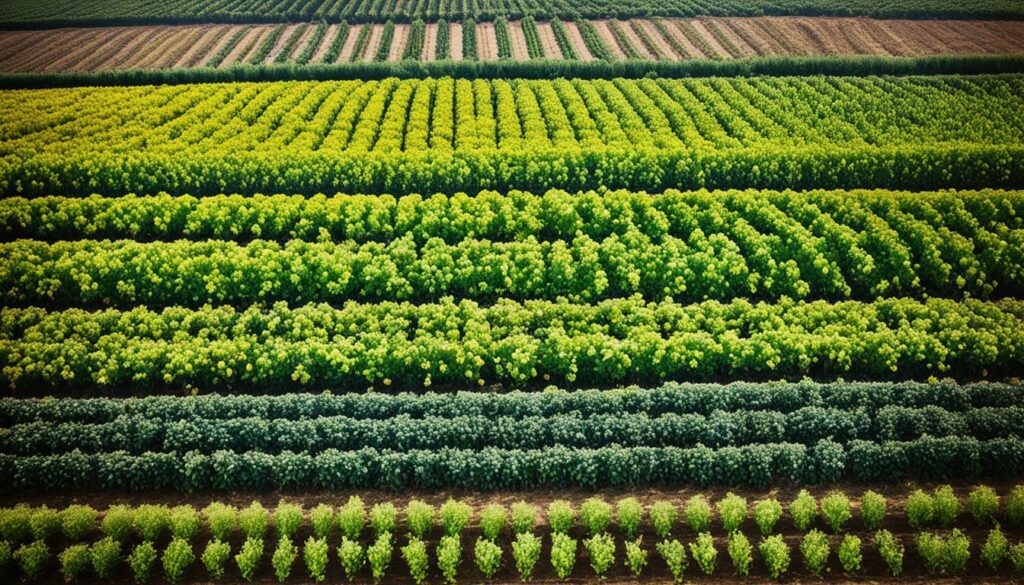
In the beginning, farming in Israel relied on essential methods. Things like dry farming and simple irrigation were vital. Because of little water and arid land, farmers had to work hard. These efforts were the start of amazing agricultural advances.
Israel’s farming approach grew more technically focused as the nation developed. Innovations like drip irrigation changed how water was used globally. The government, research, and private sector all played key roles in this change.
Israel holds world records for farm productivity, thanks to its mix of old and new methods. The story of Israeli agriculture is about always adapting. It overcomes nature’s limits to stay productive.
| Key Factors | Details |
|---|---|
| Early Adaptation | Israeli farmers are known for being early and fast adapters to new technologies. |
| Innovation and Entrepreneurship | Key to the success of Israeli agriculture, fostering advanced farming techniques. |
| Support System | Includes funding, regulation, legal support, R&D infrastructure, networking, and marketing assistance. |
| Global Influence | Globalisation has enabled international conglomerates to dominate the Israeli agricultural market. |
| Government Involvement | In recent years, the Israeli government has reduced its involvement in the agricultural sector. |
In 2017, an OECD report praised Israel’s farming growth over the world’s. The nation focuses on new technology to boost farming. It’s about making more, saving water, and being greener.
In Israel, farming is rapidly changing because of several big reasons. Climate change, digitalisation, and globalisation urge farmers to find new, smart ways to grow crops. This includes using high-tech solutions to use less water and still grow a lot of food.
Climate change is a big deal for farming in Israel. There’s less water and the weather is all over the place. Farmers are using smart technology, like AI for watering their fields, to save water. This not only helps the environment but also makes sure their crops grow well.
Technology is changing how farming works. Tools powered by AI, such as Bayer FieldView, are raising crop yields. They make farming more efficient by using data to make quick decisions. This is handy in a world where moving fast can make a big difference.
Also, the world is becoming more connected, thanks to globalisation. This means new farming ideas from Israel are quickly spreading around the world. But as bigger foreign companies get involved, the farming world might change. They might focus more on new markets and less on small, cutting-edge ideas.
This changing world of agriculture shows how important it is to keep innovating. Everyone in the farming community must work together to keep on improving. Even though the government is less involved now, teamwork in Israel is still strong. This helps them stay at the forefront of farming’s future, even with the big global challenges ahead.
Israeli farms are leading the way by embracing high-tech solutions. They are changing the way we think about farming. They use modern artificial intelligence, smart sensors, and new water management methods. These technologies help farmers use resources better and grow more food. This makes farming smarter and more efficient worldwide.
According to a 2017 OECD report, Israel’s agriculture has seen rapid growth. This growth is above the global average, showing Israel’s agritech is really making a difference. It has the potential to help small farmers in Africa and Asia. Israeli innovations are benefiting farmers around the world.
| Category | Technological Integration | Impact |
|---|---|---|
| Irrigation & Water Management | Netafim’s advanced irrigation systems | Enhanced water efficiency and crop yields |
| Integrated Pest Management | Biobee’s biological solutions | Reduced chemical use by 30% |
| AI-Powered Solutions | CropIn farm solutions | 10-30% increase in productivity |
| Knowledge Dissemination | Farmster’s mobile technology | Expanded sales options for smallholders |
The Israeli Agrotech sector isn’t just about crops. It includes animal care, dairy technology, food safety after harvest, and sharing farming knowledge. This shows Israel’s wide influence in the field of advanced farming.
Israel is also working with countries like India and Vietnam to share its techniques. Projects such as Tikkun Olam Ventures want to help African farmers. This effort highlights Israel’s push for sustainable agriculture everywhere.
In Israel, advanced farming methods show the country’s skill in boosting output despite tough situations. Israel is known for being very efficient with its use of land, water, and workforce. It leads globally in these aspects. Key to these achievements are drip irrigation systems and the application of artificial intelligence in agriculture.
The success of precision farming in Israel is rooted in a strong environment that backs it. This involves finance, rules, research, and more. Such support encourages new ideas and businesses across the farming process, helping them to reach great success.
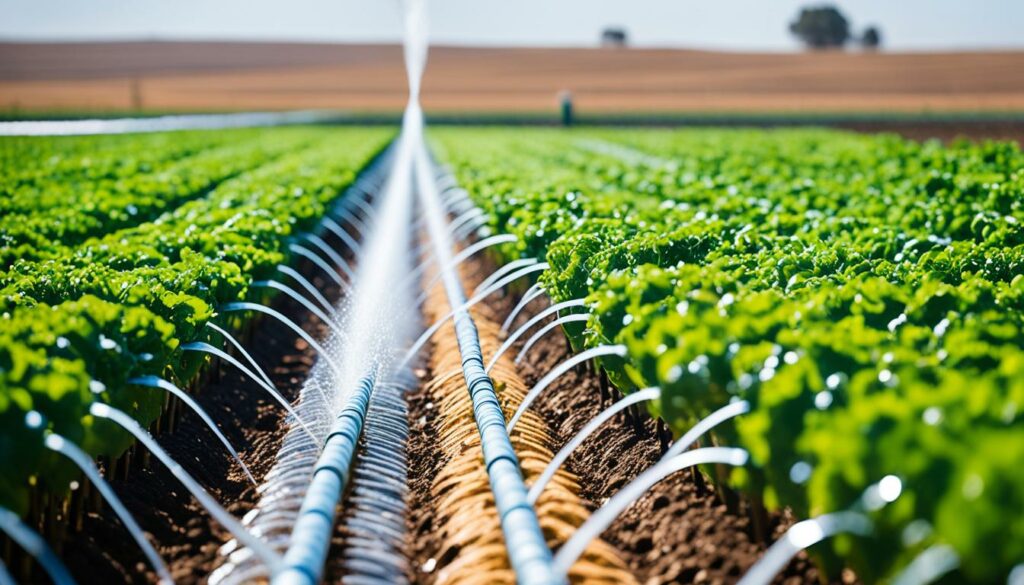
Israel is a pioneer in drip irrigation, a method that targets plants’ roots with water and nutrients. Developed by Netafim, these systems use water very efficiently, vital in Israel’s dry climate. An impressive 80% of water is reused there. Drip irrigation boosts crop yield and helps the environment by reducing water waste.
Artificial intelligence is crucial in Israel’s farming advancements. Heavyweights like Taranis and SupPlant push the tech forward. Taranis uses detailed aerial photos to spot crop diseases and pest attacks, improving how farmers use resources. SupPlant’s AI irrigation can increase crop health by 5% and cut water use by 20%. This tech lets Israeli farmers manage their land smartly and make decisions based on facts, raising their farms’ efficiency.
Israel lead the way in adopting these new technologies, showing off its inventive environment. With Israel setting the example on doing more with less, other countries looking to change their agriculture can learn a lot from their precision farming successes.
Israel is doing great in improving crop monitoring by using big data and sensor technology. This helps deal with problems like lack of water and arid soil.
In Israel, big data is changing the way we observe crops. It looks at climate data and soil, helping farmers make smart choices. This boosts crop health and manages resources better, crucial where resources are scarce.
Sensor tech is a big step in Israel’s farming scene, allowing real-time checks on crops. These sensors keep an eye on soil dampness, temperature, and nutrients. They work with data systems to give tips that prevent crop losses because of bad weather or pests.
These tech-savvy methods make individual farms more effective. Also, they show the world how Israel is leading in smart farming. As these methods get better and spread, they offer new hope for global food safety. They prove that mixing crop monitoring analytics with modern tech works wonders.
Water management is key in precision agriculture, especially in Israel. This country faces dry weather and little water. So, it has found smart ways to use recycled water and soil additives. These help make every drop count. With technologies for better irrigation, Israel leads in both water saving and farming success.
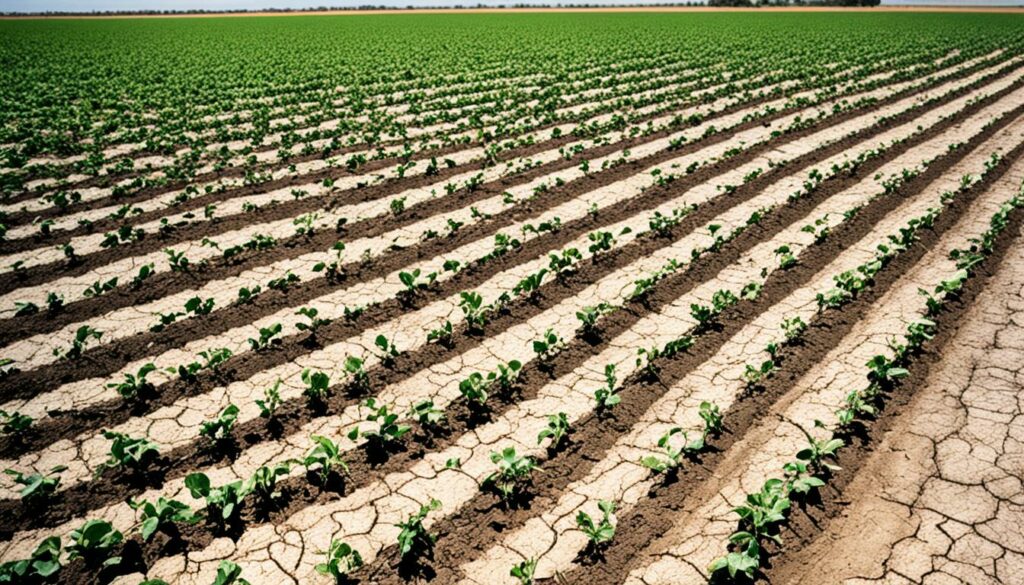
Israel stands out by reusing water for its crops. It treats and reuses wastewater to grow plants. This step fights water scarcity and boosts the planet. AI and computer vision play a big part. They help keep irrigation systems in check, saving water.
Israel also uses special soil additives to retain more water. These additions mean less need for regular watering. This saves a lot of water. Plants can grow better, even when it’s dry. So, this method helps farming use water wisely.
| Key Factors | Details |
|---|---|
| Technological Integration | Irrigation Systems, AI, Computer Vision |
| Water Management Techniques | Recycled Wastewater, Moisture-Retaining Additives |
| Challenges | Arid Soil, Water Scarcity |
| Benefits | Sustainable Farming, Optimal Water Usage |
Israel has made big steps in cotton farming. These steps are great for dry areas and farms that need more water. Even with tough weather, Israeli farmers are doing well. They use smart ways to grow crops.
In Israel, cotton farming is a shining example. The dry weather there makes farming hard. But, with new ideas and technologies, they’re growing more cotton than before.
They use modern irrigation systems that save water. These systems make sure the plants get just the water they need. This helps the crops to stay healthy without wasting water.
Israel’s way of growing cotton teaches us a lot. They focus on using water and nutrients smartly. This leads to better use of resources.
Plus, they’ve made cotton plants that can survive dry times. This shows how new ideas can make farming better. It helps the environment and the farms be more productive.
Israel’s success with cotton farming is a guide for the world. They show how precision farming can change things. This is important for making sure there’s enough food for everyone.
Israeli agriculture is changing fast, thanks to new technology. This change is making new skills very important for jobs in farming. Today, farming isn’t just about the old ways; it’s about using high-tech methods that need a diverse set of skills.
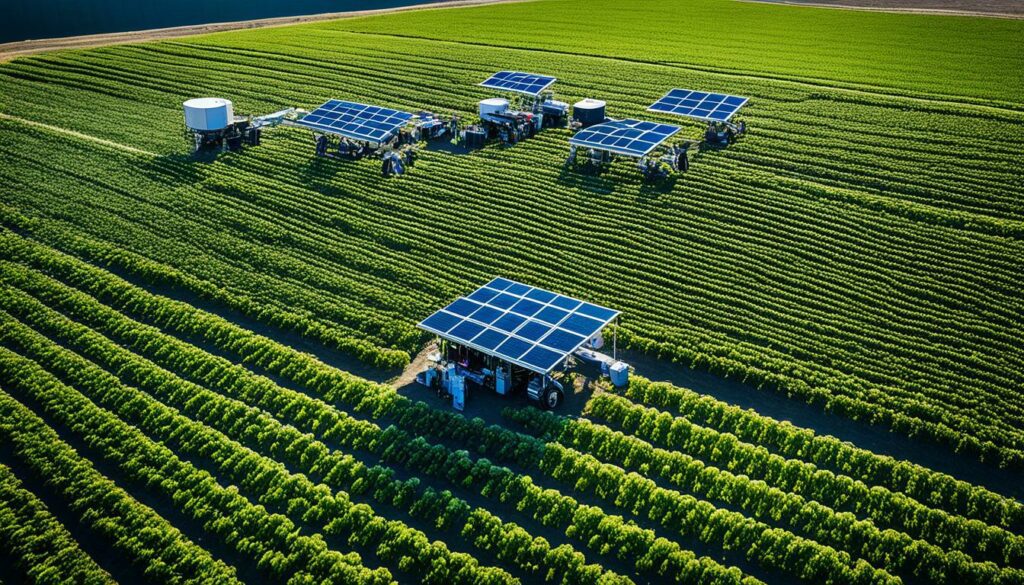
The agri-tech field in Israel needs people who know a bit of everything. Jobs now require knowledge in fields like biotechnology, engineering, and information technology (ICT). For example, we now need experts in LED lights for growing plants indoors. To catch up, schools are introducing special courses to fill these new skill needs.
Skills like teamwork and good communication are very important, too. They help in working well with others in a world where things change quickly. Israel is working hard to prepare its people for these new types of jobs by making new courses and partnerships.
| Job Role | Required Competences | Sector Demand |
|---|---|---|
| Biotechnologists | Scientific research, laboratory skills | High |
| Agronomists | Agronomy, soil science | Moderate |
| ICT Specialists | ICT, data analytics | Increasing |
| AI Technicians | Artificial intelligence, machine learning | High |
| LED Light Experts | Indoor growing, horticulture | Increasing |
Israel is becoming a big player in the agri-tech world. Its ability to attract investment and foster innovation is leading the agriculture sector. This growth is creating new and exciting jobs that need a workforce ready for change.
Precision agriculture has many challenges because technology is always changing. Dealing with new advancements quickly and understanding global markets needs foresight. There are many opportunities in global agriculture, but also complex issues.
Keeping up with fast-evolving technology is a key challenge for precision agriculture. As data analysis and real-time solutions get better, farmers and agri-tech companies must upgrade constantly. Israel, with its high productivity, uses top tech like advanced irrigation and computerised vision to stay ahead.
Adapting to this change requires strong support like funding and good laws. Although Israel has great innovation support, the era of big companies buying Israeli firms makes its market tough. To succeed, firm’s need smart strategies in this competitive field.
Precision agriculture is influenced heavily by global trends. Open borders make new ideas spread fast, increasing competition but show a downside too. Big firms taking over in Israel highlight these challenges.
The shift from government to private sector control, though good for innovation, presents challenges. Israel manages despite this, showcasing intelligent resource use and new market tactics. Also, it’s crucial to have various skills from biotech to business in the agri-tech business now. This ensures Israel stays a key player in this field.
The innovation ecosystem in agriculture in Israel is complex, including the government, schools, and businesses. Together, they have made Israel a leader in agriculture worldwide. Israeli agriculture has set many world records thanks to ongoing investment in research. This support is key to their success.
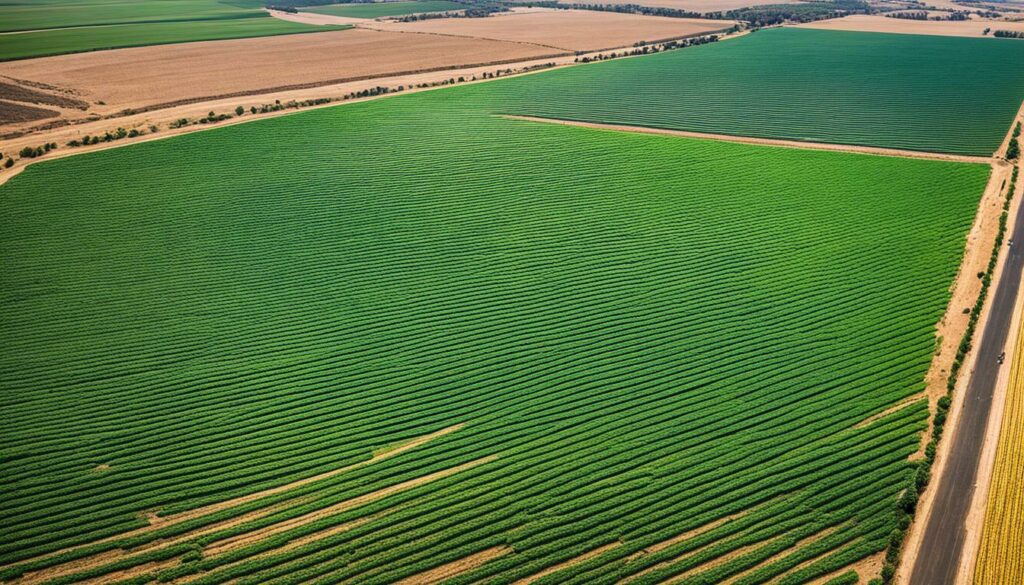
The government has a big part in fostering innovation. It may be doing less now, but its early work is very important. Their funds and rules have made a great place for new ideas. Schools and research labs also play a big role. They help develop new farming methods and technology. This keeps Israel leading in agriculture tech.
The private sector is just as important. Companies in services, farming, and exporting goods help turn ideas into real products. They use new tech to boost how we farm and protect the environment. But, some worry about big foreign companies buying local businesses. This might change Israel’s innovation and market strategies in the long run.
Strong research, good policies, and active companies make a powerful innovation ecosystem in agriculture. Even with changes in government help and the market, these groups keep Israel ahead in farming. Their teamwork ensures Israel helps make the world’s food safer and more secure.
In the future, precision agriculture will advance, with Israel leading the way. They’re using vertical farming and AI in farming to change how we grow food. This will reshape farming practices in a big way.
Vertical farming offers a new way to farm, especially in areas with little space. It uses technology to grow more food in less space. This is very helpful in cities where space is at a premium. It’s changing farming by making it more efficient and by using fewer resources.
AI and machine learning are making farming smarter. They help with things like predicting crop health and automating hard work. The aim is to boost productivity and be kinder to the environment. By looking at lots of data, these systems give farmers tools to make better decisions.
In 2022, precision agriculture was a USD 55.18 million market. It’s expected to grow by 6.84% each year from 2023 to 2028. This growth is thanks to new tech and a strong start-up scene. Yet, the costs and worry about making a profit are still big issues.
| Aspect | Details |
|---|---|
| Market Size (2022) | USD 55.18 Million |
| CAGR (2023-2028) | 6.84% |
| Fastest Growing Segment | Software |
| Key Market Drivers |
|
| Key Market Challenges |
|
| Key Market Trends | Increasing Adoption of IoT |
Israel is taking big steps in the future of farming. They’re using vertical farming and AI to tackle farming issues today and tomorrow. This ensures a future where farming is both sustainable and productive.
Israel should lead in agri-tech by taking on new challenges through improved policies. This means creating new educational content to enhance skills, finding and fixing gaps in education, and teaming up schools with businesses.
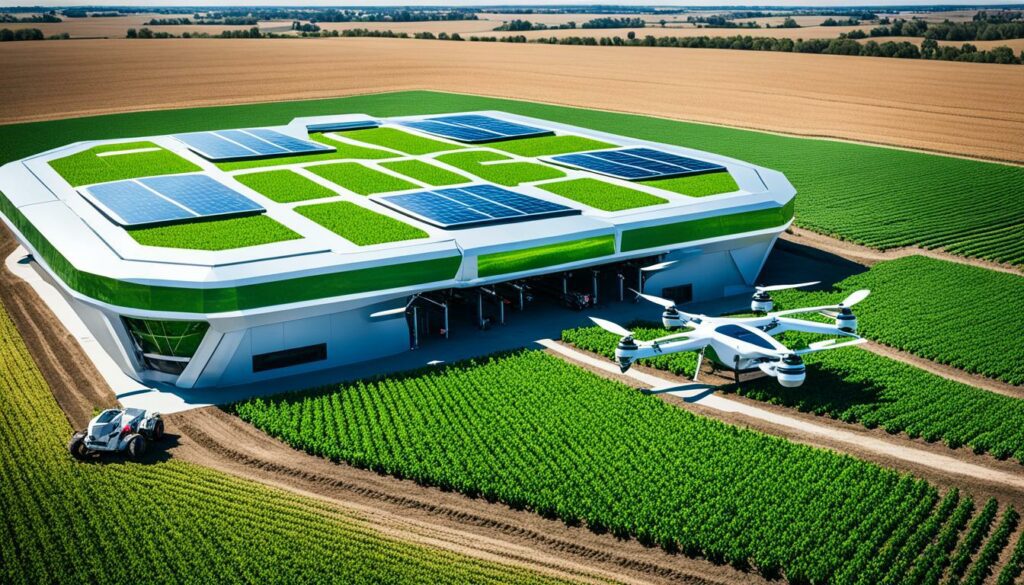
It’s vital to create educational modules that explore the latest in tech, like AI and advanced farming methods. By adding these to the usual lessons, the upcoming workforce will stay ahead. Its all about smoothly bringing in new skills and keeping everyone up to date.
There’s a need to check if the current curriculum has all the right parts to help agri-tech grow further. Leaders and schools should work together to find and fix missing pieces. This updated teaching will make sure workers are skilled in tech and important soft skills, like working well with others in jobs like marketing or sales.
A look at some urgent areas for change is shown in the table below:
| Current Focus | Required Enhancements |
|---|---|
| Technical skills in traditional farming | Integration of AI, data analysis, and advanced irrigation techniques |
| Vocational training | Emphasis on transversal skills and multidisciplinary competences |
| Existing R&D efforts | Strengthening partnerships with the private sector for better innovation outcomes |
So, the right agri-tech policies have to focus on better education and training. They also need to promote strong links between those in industry and those in schools. This way, Israel can lead the world in agri-tech, with a skilled team ready for anything.
Israeli technology in agriculture is changing farming worldwide. It’s solving issues like lack of water and turning dry lands fertile. This progress isn’t only helping Israel; it’s also making a big difference for everyone’s food security and the environment. Israel’s agri-tech innovations are showing how to improve in these key areas.
Israel’s smart farming methods include using less water and monitoring crops with AI. Companies like Netafim and SupPlant are at the forefront. They use advanced technologies to increase crop yields, save water, and grow food more efficiently. This helps not only in Israel but also in places worldwide that struggle with little water.
Israel is a key player in taking care of the planet with its green farming solutions. They have tips like using recycled water and special soil to help plants grow better. Technologies from companies such as Taranis are also important. They help farmers worldwide manage their resources wisely, making farming more sustainable.
Israel is known for its cutting-edge agriculture solutions. Its achievements help inspire other countries to better their farming practices. Thanks to Israel, the world is moving towards a future where farming is both greener and more reliable.
Israel is famous for bold agricultural advances, notably in tough spots like the Golan Heights and Negev Desert. The stories from these places show how farming can be both efficient and kind to the planet.
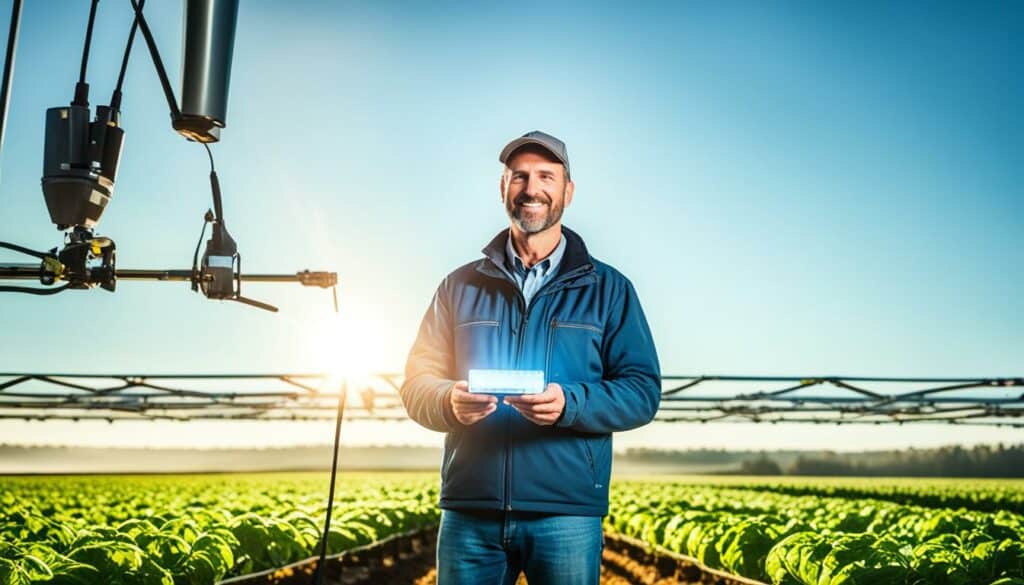
The Golan Heights blend old ways with new tech in farming. Farmers use precise methods, especially with vines and orchards. They watch soil moisture closely with sensors. This helps them use water smartly, giving plants just the right amount. The results are clear: bigger crop yields and better produce.
The Negev Desert is a place of creative wins over tough odds. Farmers here use smart water methods like drip irrigation and reusing wastewater. These steps cut down on water use but still keep crops healthy. Plus, they’ve found ways to keep soil moist longer, helping crops grow in harsh settings. These farming tweaks show Israel moving strongly into greener agriculture.
| Region | Key Innovations | Impact |
|---|---|---|
| Golan Heights | Sensor-Based Monitoring | Improved Water Management |
| Negev Desert | Drip Irrigation, Recycled Wastewater | Enhanced Crop Productivity |
Their stories shine a light on Israeli farmers’ ingenuity and flexibility. They prove that precision in farming can change even the toughest lands. With a dedication to being smart and green, Golan Heights and Negev farmers are leading the way in farming excellence.
Looking at precision agriculture in Israel, the impact of new technology is clear. Israel’s agriculture is growing fast, leading the world in efficiency. This shows how Israel’s use of precision agriculture can guide farming across the globe towards sustainability.
New tech and projects are boosting crop yields, making water use better, and supporting the environment. Israel shows us new ways to farm, helping farmers in places like Africa and Asia. But it’s not just about new tools; good rules and creative ideas also play a big part.
PickApp Farming Ltd. is a good example. It uses technology to save money and work better. Their system, which can be used in many languages, helps cut down on costs by 20-30%. This is a big deal, especially in places like Mexico, Spain, and South Africa.
Israel’s work in precision agriculture is a guide for farming in dry, low-resource places. With these methods, farmers can do better despite tough times. This Israeli model mixes innovation, smart use of resources, and direct solutions. It’s a great way to aim for sustainable farming all around the world.
Precision agriculture in Israel uses the latest technologies. This includes AI, big data, and sensors. They help farmers grow crops more efficiently by monitoring resources closely. This leads to better results in crop yields.
Israel stands out for its innovations in agriculture. It’s a leader in using drip irrigation and AI. These technologies are vital in dry areas, managing with little water. Israel has shown the world what sustainable farming looks like.
Israel’s agriculture started with basic methods to survive tough conditions. It has become highly advanced today. This is clear in the use of drip irrigation systems that have spread widely.
Climate change, globalisation, and digital growth are key forces for change. They push for more resilient farming that uses technology. This ensures both sustainability and staying competitive.
Fields in Israel use AI for predicting crop growth. They also use sensors to manage resources with great accuracy. Water is managed innovatively to get the best out of every drop.
Israel uses drip irrigation to water crops precisely. AI is employed to monitor plant health and manage resources smartly. These methods are a big part of how farming is evolving in Israel.
Israel uses big data and sensors to keep track of crops. They collect and study large amounts of data. This analysis helps farmers make better decisions and manage their crops more effectively.
Water management is critical in Israel’s farming. They use recycled water and add special substances to the soil to hold moisture. This transforms water scarcity into a chance for innovation and sustainable growth.
In Israel, cotton farming in dry areas is a great example. By carefully rotating crops and using smart irrigation and nutrients, they save water and get better crops. This approach has been very successful.
The agriculture technology sector in Israel needs many new skills. There’s a big push for people who know about several fields, like biotechnology and engineering. This shows the need for ongoing professional growth.
Rapid tech changes, globalisation, and the power of big companies pose challenges. Overcoming these requires smart, fast strategies to keep advancing and innovating.
Israel supports farming technology by working together – the government, schools, and businesses. They provide money, rules, research, and meetings to help develop new, effective solutions for farming.
Israel is moving towards farming indoors and up in the air, as well as using more AI and learning machines. This means how we grow food will change, needing new kinds of skills.
Important steps include making new learning opportunities, fixing what’s lacking in studies, and making close ties between schools and businesses. This will help ensure there are skilled people ready to keep innovating.
Israel’s farming technology is key for feeding the world and doing farming sustainably. By sharing what they know and working together, they offer important knowledge for other areas facing similar challenges.
Israeli farmers have seen great results with precision farming in places like Golan Heights and Negev. By using modern techniques like monitoring with sensors and managing water carefully, they’ve tackled environmental issues and boosted their crops.